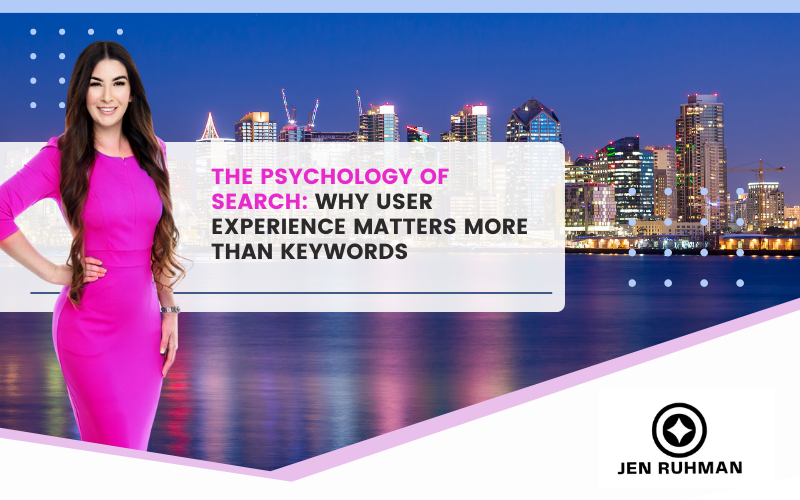Quick Answer
Search engines like Google now prioritize user experience (UX) over keyword stuffing. This means that how your visitors interact with your website—page speed, navigation, readability, and trust signals—directly impacts your rankings. As an SEO expert in San Diego, I’ve seen firsthand that sites with strong UX consistently outrank those relying only on keywords.
Why This Matters for Your Business
I’m Jen Ruhman, owner of Jen Ruhman SEO, a SEO company in San Diego. When I first started helping local businesses with SEO, most owners assumed that ranking was just about stuffing keywords into a page. But I quickly learned—and continue to see today—that search engines have evolved.
It’s not just about what words you use. It’s about how people feel when they land on your website. Are they frustrated? Confused? Or do they feel confident, understood, and ready to take action?
Let’s dig into why the psychology of search is so powerful and why focusing on user experience beats chasing keywords every single time.
Understanding the Psychology of Search
When someone types (or now speaks) a search into Google, they’re not just looking for words. They’re looking for solutions. Behind every search query, there’s a human emotion or need driving it.
Someone searching “best SEO company San Diego” is really saying: I need a trusted local expert to help me grow my business online.
A person searching “how to rank higher on Google” is really saying: I’m frustrated my website isn’t getting traffic and I need a simple explanation.
If your website addresses these emotions clearly and confidently, you’re already ahead of competitors who only care about keywords.
My Early Lesson in UX vs. Keywords
When I first started my SEO career, I worked with a client who had stuffed their homepage with keywords like “plumber San Diego” dozens of times. It technically looked “optimized,” but it read terribly. Customers were bouncing within seconds.
After we redesigned the site to focus on easy navigation, clear messaging, and fast load speeds, the rankings shot up—and, more importantly, the phone started ringing again.
That was my “aha moment”: people come first, algorithms second.
Why User Experience Matters More Than Keywords
1. Google’s Algorithms Value Satisfaction
Google uses signals like bounce rate, time on page, and click-through rate to measure how happy people are with your site. If users don’t stick around, your rankings drop—even if you have perfect keyword density.
2. Trust Equals Conversions
People don’t just want answers; they want answers from someone they trust. That’s why having clear contact info, testimonials, and local expertise is so important. For example, I always make sure my phone number—Call/Text: (619) 719-1315—is easy to find on my site. That small detail reassures visitors I’m a real person they can reach.
3. Mobile-First World
Most searches today happen on mobile devices. If your site isn’t mobile-friendly, you’re not only frustrating users but also signaling to Google that your site isn’t modern or helpful.
Optimizing for AI Search & SGE
Search is changing again with AI-driven results and Google’s Search Generative Experience (SGE). Instead of just listing links, search engines are trying to give users direct, conversational answers.
To stay ahead:
Provide clear, fact-based summaries near the top of your content (like the quick answer above).
Use simple, scannable language.
Demonstrate expertise, experience, authority, and trust (E-E-A-T) through examples, credentials, and case studies.
That’s why I weave in real stories from my SEO work in San Diego—it shows I’ve lived this, not just read about it.
Practical Ways to Improve UX Today
Make Navigation Intuitive
Imagine walking into a store with no signs. That’s what a confusing website feels like. Use clear menus, breadcrumbs, and calls to action.
Prioritize Speed
If your site takes longer than 3 seconds to load, visitors will leave. I recommend compressing images, using good hosting, and minimizing code bloat.
Write for Humans, Not Robots
Instead of repeating “SEO expert in San Diego” ten times, naturally explain what you do and why it matters. That’s why I love telling client success stories—it keeps content engaging and authentic.
Build Local Trust
For local businesses, showcasing your San Diego roots helps both users and rankings. Share photos, highlight community involvement, and list your service area clearly.
Example From My Clients
One of my favorite projects was helping a San Diego-based medical practice. They were frustrated because, despite having all the “right” keywords on their site, no one was booking appointments.
We reworked their site to include patient-friendly explanations, an easy booking button, and trust-building testimonials. Within months, their organic traffic doubled, and they saw a noticeable increase in new patients.
This transformation wasn’t about keywords—it was about psychology and user experience.
The Bottom Line
At the end of the day, SEO is about people. Keywords get you in the door, but experience keeps people engaged and builds trust.
That’s why when I work with clients through my SEO services in San Diego, I focus not just on ranking—but on creating a seamless, trustworthy experience that turns visitors into customers.
If you’re tired of guessing what Google wants and you want a proven strategy that actually brings in leads, let’s talk.
I’m Jen Ruhman, a local SEO expert in San Diego, and I’d love to help your business grow.
Call/Text me directly at (619) 719-1315


